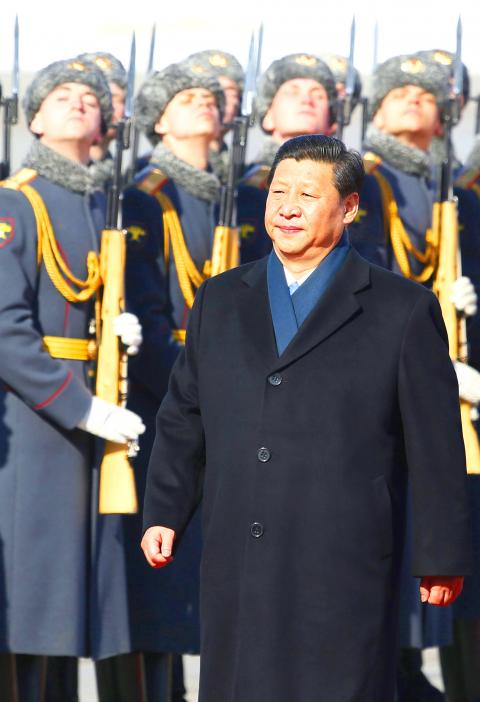Chinese President Xi Jinping (習近平) sent a signal to the US and Europe yesterday by visiting Russia on his first foreign trip as leader, underlining the importance of Beijing’s growing alliance with Moscow.
The world’s largest energy producer, Russia, and its biggest consumer, China, want particularly to bolster their clout as a financial and geopolitical counterweight to Washington, whose “Asia pivot” regional strategy worries Beijing.
Xi and Russian President Vladimir Putin, who were to meet last night, may preside over deals that would make Beijing Russia’s top customer for oil, although they are not expected to sign a long-sought agreement on supplies of pipeline gas to China.

Photo: EPA
Just before Xi arrived with first lady Peng Liyuan (彭麗媛), a US$2 billion deal was announced by Russian and Chinese companies to develop coal resources in eastern Siberia, which underlined the countries’ intentions.
Putin has said he wants to “catch the Chinese wind in our economic sail” and that desire will grow stronger if China overtakes the US as the world’s largest economy during Xi’s 10-year term.
Xi’s visit overshadowed a meeting between leaders of the Russian government and the European Commission that was also taking place in Moscow.
Putin and Xi, less than a year apart in age, echoed one another in interviews before the visit, each saying the Chinese leader’s choice of Moscow as his first destination was evidence of the “strategic partnership” between the nations.
A smiling Xi, 59, recalled that he read Russian literature in his younger days. Putin, 60, said that Russian-Chinese relations were at “the best in their centuries-long history.”
The two UN Security Council members’ solidarity on important global issues has strengthened in recent years.
They have joined forces three times to block Western-backed measures on the conflict in Syria despite talk of grumbling in Beijing, and Russia has followed China’s lead on North Korea — two issues that would likely come up in yesterday’s talks.
They have negotiated alongside the West on Iran’s nuclear program, but have watered down past sanctions in the UN Security Council and opposed new punitive measures as counterproductive.
Russia has added to Japan’s woes over territorial disputes with Beijing by playing up its control of an archipelago claimed by Tokyo. Beijing and Moscow have also stood side-by-side in rejecting Western criticism of their record on human rights.
However, the lockstep movement on the global stage has not translated into easy agreement on bilateral energy deals.
A huge business complex on the edge of Moscow, decorated with Chinese paintings and red silk armchairs, is the kind of enterprise Xi wants to nurture in Russia.
Xi’s presidency is seen as a chance to put new impetus into such projects and into ties with Russia as a whole, although Putin said this week that bilateral trade had more than doubled in five years and reached US$87.5 billion last year.
However, the trade volume is still about five times smaller than that of Russia with the EU, and also far smaller than China’s trade with the US.

The US government has signed defense cooperation agreements with Japan and the Philippines to boost the deterrence capabilities of countries in the first island chain, a report by the National Security Bureau (NSB) showed. The main countries on the first island chain include the two nations and Taiwan. The bureau is to present the report at a meeting of the legislature’s Foreign Affairs and National Defense Committee tomorrow. The US military has deployed Typhon missile systems to Japan’s Yamaguchi Prefecture and Zambales province in the Philippines during their joint military exercises. It has also installed NMESIS anti-ship systems in Japan’s Okinawa

‘WIN-WIN’: The Philippines, and central and eastern European countries are important potential drone cooperation partners, Minister of Foreign Affairs Lin Chia-lung said Minister of Foreign Affairs Lin Chia-lung (林佳龍) in an interview published yesterday confirmed that there are joint ventures between Taiwan and Poland in the drone industry. Lin made the remark in an exclusive interview with the Chinese-language Liberty Times (the Taipei Times’ sister paper). The government-backed Taiwan Excellence Drone International Business Opportunities Alliance and the Polish Chamber of Unmanned Systems on Wednesday last week signed a memorandum of understanding in Poland to develop a “non-China” supply chain for drones and work together on key technologies. Asked if Taiwan prioritized Poland among central and eastern European countries in drone collaboration, Lin

NO CONFIDENCE MOTION? The premier said that being toppled by the legislature for defending the Constitution would be a democratic badge of honor for him Premier Cho Jung-tai (卓榮泰) yesterday announced that the Cabinet would not countersign the amendments to the local revenue-sharing law passed by the Legislative Yuan last month. Cho said the decision not to countersign the amendments to the Act Governing the Allocation of Government Revenues and Expenditures (財政收支劃分法) was made in accordance with the Constitution. “The decision aims to safeguard our Constitution,” he said. The Constitution stipulates the president shall, in accordance with law, promulgate laws and issue mandates with the countersignature of the head of the Executive Yuan, or with the countersignatures of both the head of the Executive Yuan and ministers or

CABINET APPROVAL: People seeking assisted reproduction must be assessed to determine whether they would be adequate parents, the planned changes say Proposed amendments to the Assisted Reproduction Act (人工生殖法) advanced yesterday by the Executive Yuan would grant married lesbian couples and single women access to legal assisted reproductive services. The proposed revisions are “based on the fundamental principle of respecting women’s reproductive autonomy,” Cabinet spokesperson Michelle Lee (李慧芝) quoted Vice Premier Cheng Li-chiun (鄭麗君), who presided over a Cabinet meeting earlier yesterday, as saying at the briefing. The draft amendment would be submitted to the legislature for review. The Ministry of Health and Welfare, which proposed the amendments, said that experts on children’s rights, gender equality, law and medicine attended cross-disciplinary meetings, adding that